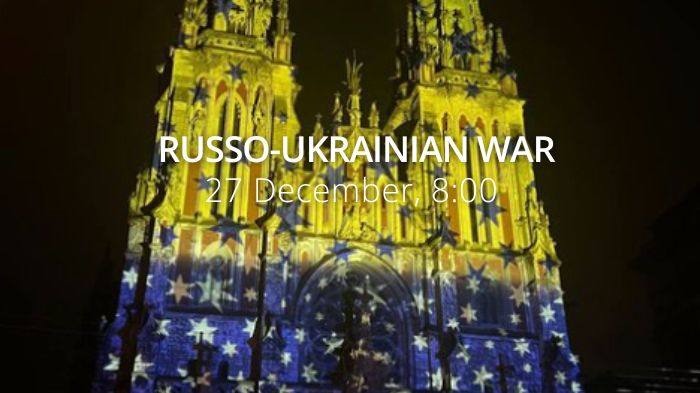Daily overview — Summary report, January 20, 2023
A map of the approximate situation on the ground in Ukraine as of 00:00 UTC 20/01/23. pic.twitter.com/jSZzGeTEJI
— War Mapper (@War_Mapper) January 20, 2023
The General Staff’s operational update regarding the Russian invasion as of 18.00 pm, January 20, 2023 is in the dropdown menu below:
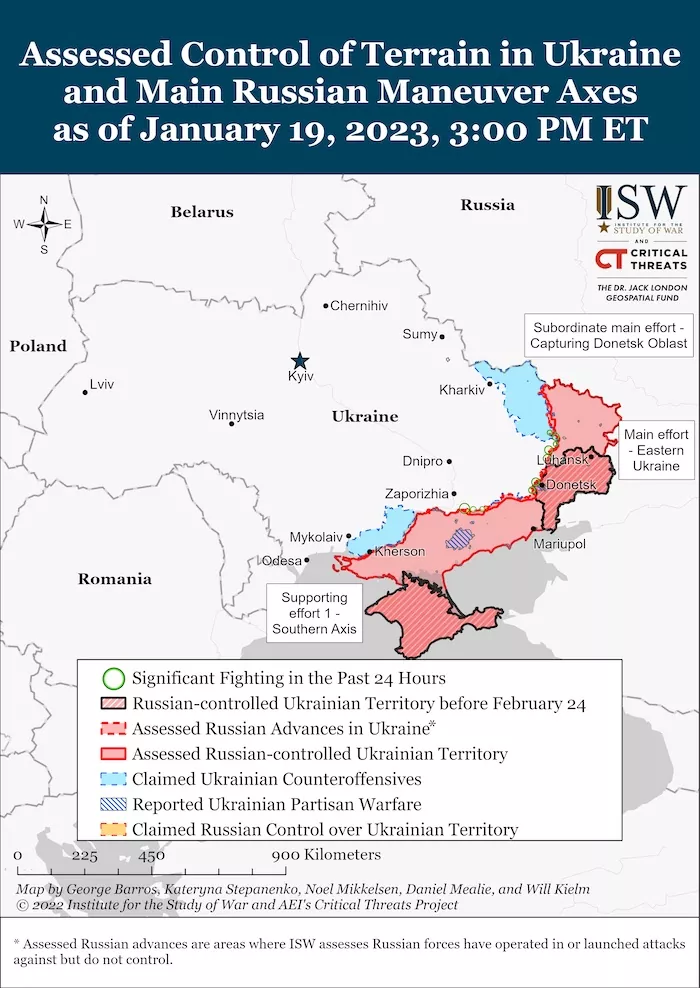
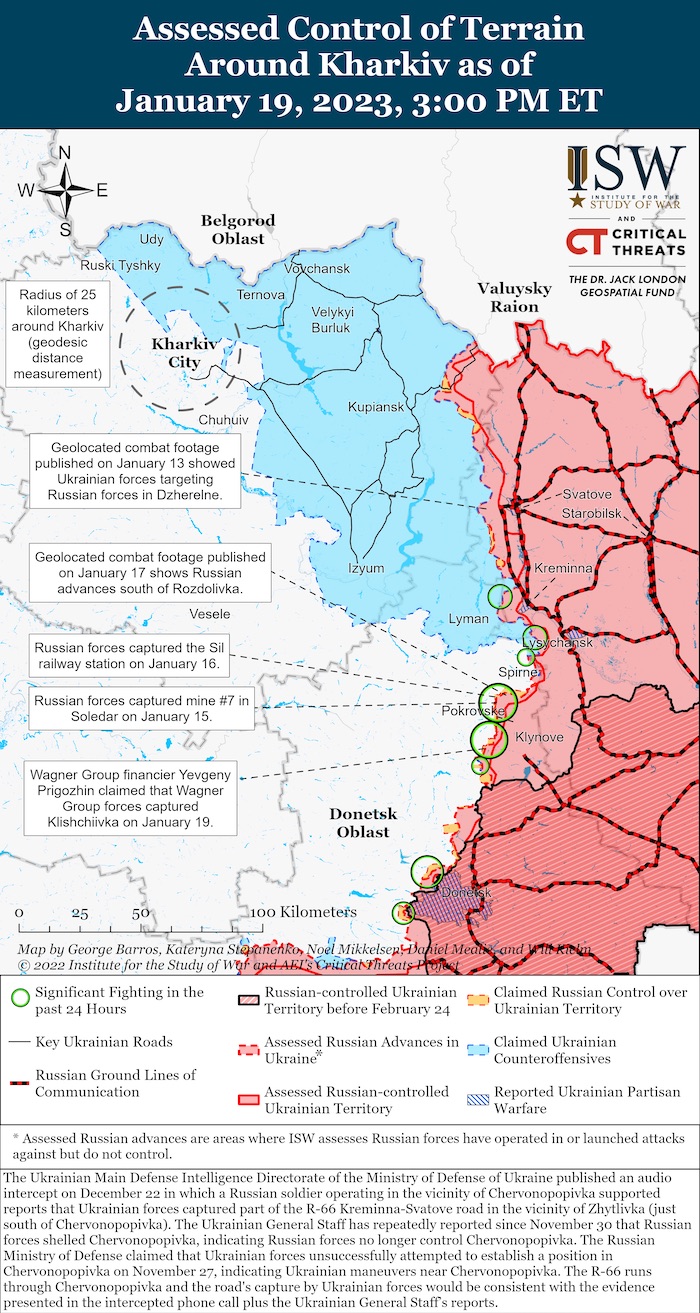
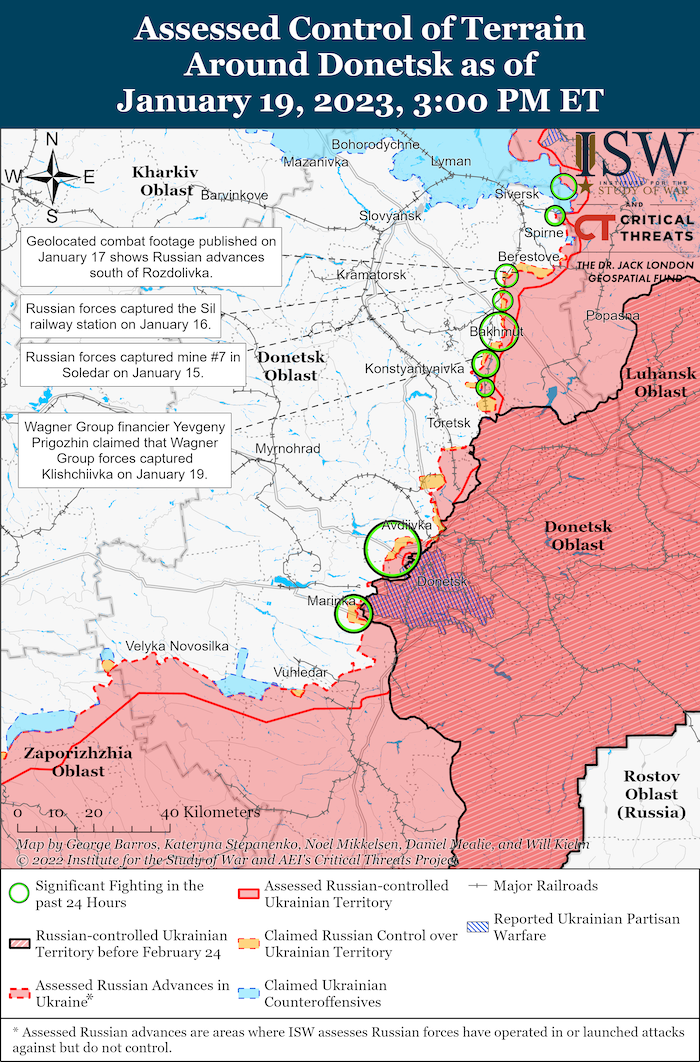
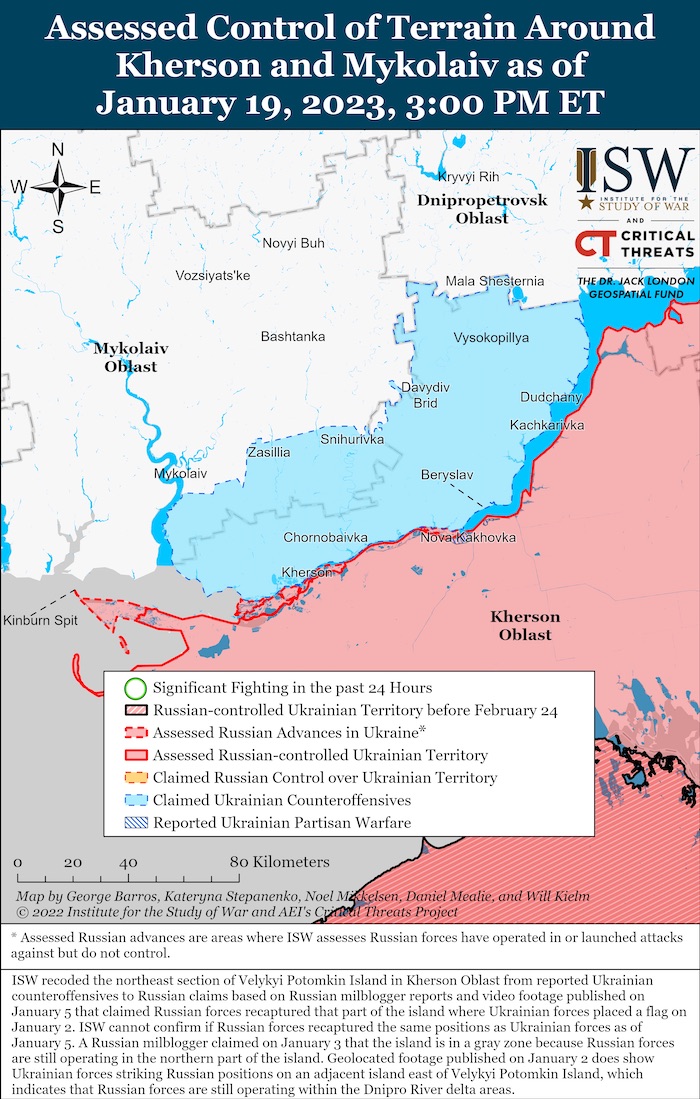
Military Updates
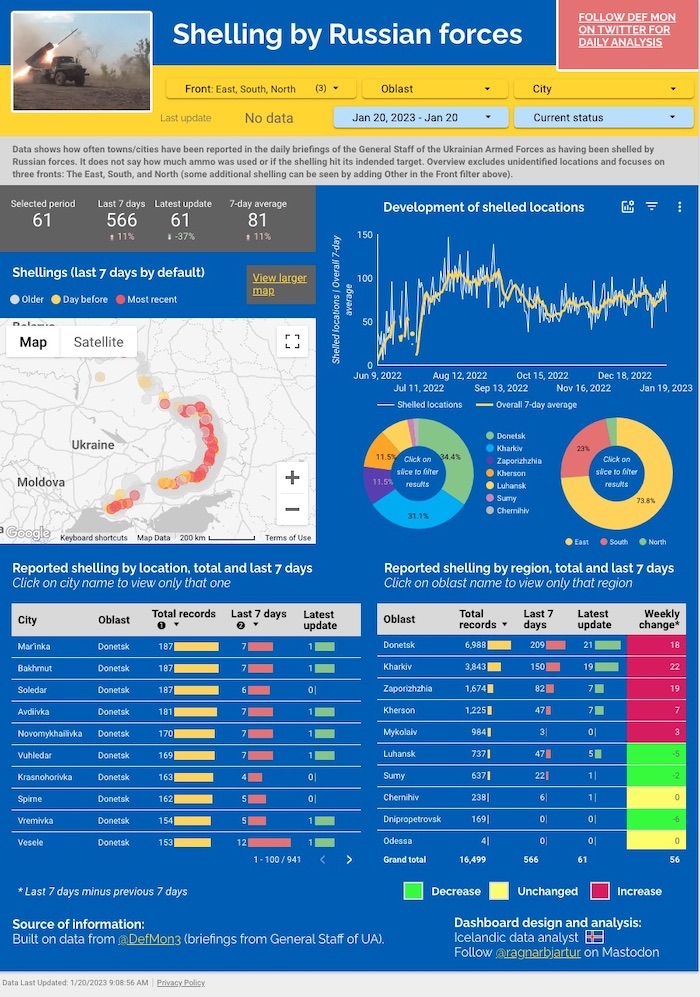
Four things Ukraine needs to close the sky in 2023: top general explainshttps://twitter.com/EuromaidanPress/status/1616117424641785863
According to British Defence Intelligence, (last 48 hours): https://twitter.com/DefenceHQ/status/1616108238600081410"[Russian forces] understand that Bakhmut is an impregnable fortress."@rferl's @currenttimetv correspondent Andriy Kuzakov spent a day with a Ukrainian drone commander along the front line between Bakhmut & Soledar, where brutal fighting goes on pic.twitter.com/zK7WowmCxz
— Euromaidan Press (@EuromaidanPress) January 19, 2023
- On 27 December 2022, the Russian Unified State Register showed that the proxy paramilitary Wagner Group had formally registered as a legal entity. The group declared their core activity as ‘management consultancy’; no mention was made of combat services.
- It is not yet clear to what extent the ‘PMC Wagner Centre’ entity will be used to administer Wagner’s paramilitary activity. Private Military Companies (PMCs) remain illegal in Russia, despite protracted discussion about reforming the law. Wagner’s owner, Yevgeny Prigozhin, has likely partially funded the organisation via inflated government contracts awarded to his other companies.
- The registration continues the remarkably rapid development of the traditionally opaque group’s public profile. Prigozhin only admitted to founding Wagner in September 2022; in October 2022, it opened a glossy HQ in St Petersburg. Wagner almost certainly now commands up to 50,000 fighters in Ukraine and has become a key component of the Ukraine campaign. The registration likely aims to maximise Prigozhin’s commercial gain and to further legitimise the increasingly high-profile organisation.
Losses of the Russian army
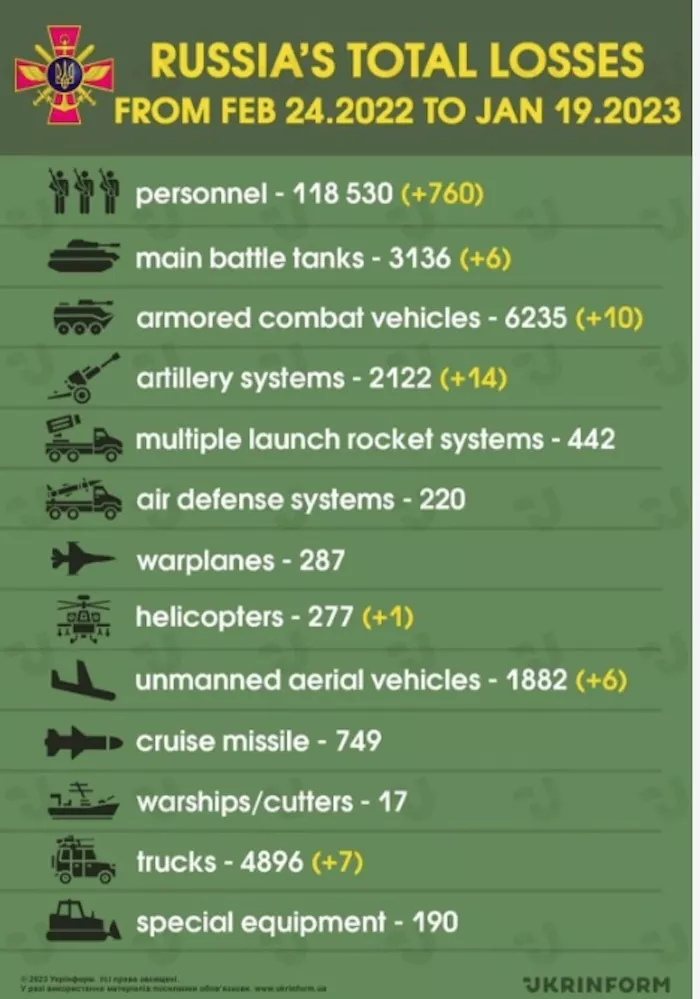
Humanitarian
As of Jan 19, 11 people are still considered missing after the Russian Jan 14 missile strike on the high-rise building in Dnipro, according to the police.As of Jan 19, 11 people are still considered missing after the Russian Jan 14 missile strike on the high-rise building in Dnipro, according to the police. https://t.co/Xc2RXJUTUn https://t.co/SfLwJSUbWn
— Euromaidan Press (@EuromaidanPress) January 19, 2023
Last night Russians once again hit Nikopol district in Dnipropetrovsk Oblast with MLRS and artillery - Oblast Head
— Euromaidan Press (@EuromaidanPress) January 19, 2023
More than 30 shells hit Chervonohryhorivka and Marhanets communities damaging homes. According to preliminary data, no one was injured.https://t.co/g6ItcmKrIe pic.twitter.com/mG6x1dL86G
Environmental
Maramures express: Ukraine launches first train to Romania after a 17-year pause. The first train connecting Ukraine with Romania has been launched on 18 January after a 17-year pause, CEO of Ukraine’s state train service Ukrzaliznytsia Oleksandr Kamyshin reported. Train #810 will connect Ukraine’s Rakhiv and Dilove to Romania’s Valea Viseului and will run twice a day.Legal
European Parliament pushes for a special tribunal to punish Russian crimes in Ukraine. On 19 January, the European Parliament adopted a resolution demanding the political and military leadership of Russia and Belarus be held accountable for the crime of aggression against Ukraine. 472 MEPs voted in favor, 19 against with 33 abstentions. DW says that a special tribunal – analogous to the Nuremberg trials – should be created in close cooperation with Ukraine, preferably through the UN, according to the adopted resolution. https://twitter.com/ZarinaZabrisky/status/1616092998810451968 Crimean lecturer faces 5-year sentence for writing about Russia’s killing of innocent civilians in Ukraine. Andriy Bielozierov is under house arrest in occupied Crimea, facing preposterous criminal charges of ‘discrediting the Russian army’, although it is Moscow and its soldiers who discredit Russia by bombing and killing civilians. He has already lost his job as a lecturer, been beaten by enforcement officers and spent two brief terms of imprisonment for Ukrainian songs and could now be imprisoned for up to five years for telling the truth about Russia’s war against his native Ukraine.Support
Netherlands says open to paying for Leopard tanks for Ukraine
— Euromaidan Press (@EuromaidanPress) January 20, 2023
Dutch defense minister speaks in interview from Davos. Suggests similar approach to one used to pay for Czech tankshttps://t.co/zOkKpdFd2Z
New Developments
Iran does not recognize Russia’s annexation of Crimea, foreign minister says. Iranian Foreign Minister Hossein Amirabdollahian has said that Iran does not recognize Russia’s annexation of Crimea “despite excellent relations between Tehran and Moscow” in an interview with TRT World. Iran opposes Russia’s military aggression and displacement of people in Ukraine and hopes for political solutions to end the war, he added. At the same time, the minister considers the actions of NATO and the West to be the main cause of the invasion. https://twitter.com/EuromaidanPress/status/1616216559466291201Assessment
- On the war.
The Institute for the Study of War has made the following assessment as of January 19, 2023:
- Senior Kremlin officials continue holding high-level meetings with Belarusian national leadership – an activity that could set conditions for a Russian attack against Ukraine from Belarus, although not necessarily and not in the coming weeks.
- A new Russian attack against Ukraine from Belarus in early 2023 seems less likely given current Russian military activity in Belarus, although an attack from Belarus in late 2023 seems more plausible.
- Ultranationalist Russian milbloggers continue to criticize the idea of Russian forces attacking Ukraine from Belarus.
- Russian Foreign Minister Sergey Lavrov attacked the Organization for Security and Co-operation in Europe (OSCE), underscoring the infeasibility of the Kremlin supporting a third Minsk-type agreement.
- Lukashenko continues to balance against the Kremlin by framing Belarus as a sovereign state within the Russian-dominated Union State.
- The Kremlin continues to falsely promote a narrative that the war will escalate if Ukraine receives weapons with the capability to strike Russian forces in occupied Crimea.
- An extremist Kremlin ally reintroduced nuclear escalation rhetoric aimed at scaring Western policymakers away from providing additional military aid to Ukraine.
- Russian President Vladimir Putin is increasingly siding with the enemies of Wagner Group financier Yevgeny Prigozhin, likely in an ongoing effort to reduce Prigozhin’s influence in Russia.
- Prigozhin’s continued use of the Wagner Group’s claimed tactical success to elevate his position is likely deepening a conflict with the Russian Ministry of Defense (MoD) for influence in the Russian information space.
- Russian Chief of the General Staff Army General Valery Gerasimov may have officially declared that the Wagner Group does not belong in the structure of the Russian Armed Forces and that the Russian military does not collaborate with Wagner despite ample evidence to the contrary.
- Ukrainian forces reportedly continued counteroffensive operations near Svatove, and Russian forces conducted limited counterattacks near Kreminna.
- Russian sources claimed that Russian forces captured Klishchiivka amidst ongoing Russian offensive operations around Soledar, Bakhmut, and Avdiivka.
- Russian sources claimed that Russian forces conducted localized offensive operations in Zaporizhzhia Oblast.
- Russian officials are reportedly continuing to prepare for a second wave of mobilization.
- Ukrainian partisans may have conducted an IED attack in Zaporizhzhia Oblast.


